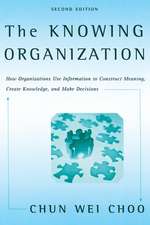Masculinity and the British Organization Man since 1945
Autor Michael Roperen Limba Engleză Hardback – 20 ian 1994
Preț: 538.81 lei
Preț vechi: 815.47 lei
-34% Nou
Puncte Express: 808
Preț estimativ în valută:
103.10€ • 107.93$ • 85.31£
103.10€ • 107.93$ • 85.31£
Carte tipărită la comandă
Livrare economică 25-31 martie
Preluare comenzi: 021 569.72.76
Specificații
ISBN-13: 9780198256939
ISBN-10: 0198256930
Pagini: 272
Ilustrații: frontispiece, halftones
Dimensiuni: 146 x 225 x 20 mm
Greutate: 0.46 kg
Editura: OUP OXFORD
Colecția OUP Oxford
Locul publicării:Oxford, United Kingdom
ISBN-10: 0198256930
Pagini: 272
Ilustrații: frontispiece, halftones
Dimensiuni: 146 x 225 x 20 mm
Greutate: 0.46 kg
Editura: OUP OXFORD
Colecția OUP Oxford
Locul publicării:Oxford, United Kingdom
Recenzii
`Against the trend of recent books on women in management, this book explores the "emotional economy that operates between male managers" ... It is essentially about understanding the schizophrenic nature of corporate man, the underlying emotions that belie his dispassionate bureaucratic image ... a well structured, well-written and thoughtful book ... This book is not only a good read, but an attempt to get us to focus on "what ought to be".'Times Higher Education Supplement
`read in conjunction with some of the classic studies by Dalton or Burns and Stalker, this study provides some persuasive and provocative insights into managerial lives and careers. Further, read carefully, this elegantly written study might provide readers with insights into their own institutions and their own daily working practices.'Work, Employment and Society
'a well structured, well-written and thoughtful book ... This book is not only a good read, but an attempt to get us to focus on "what ought to be".'Times Higher Education Supplement
`Those looking for a more daring gift, notably modern women married to unreconstructed males, might slip their partner Michael Roper's Masculinity and the British Organization Man since 1945.'Financial Times
`read carefully, this elegantly written study might provide readers with insights into their own institutions and their own daily working practices'Work, Employment and Society
`most enjoyable read'Financial Times
'Roper's stimulating examination of the life histories of 30 managers - 25 men and 5 women - challenges the myth of the rational organisational man ... This provocative book makes a remarkable contribution to our understanding of a neglected dimension of British management ... it deserves to be widely read by business historians.'Alan McKinlay, Glasgow University, Business History
Am impressive piece of research. His interviewing skills elicited sensitive and illuminating data ... The book's emphasis on the cultural and psychological dimensions of gender inequality will influence future research on gender and organizations.
This provocative book makes a remarkable contribution to our understanding of a neglected dimension of British management ... deserves to be widely read by business historians.
Bold and richly complex examination of the life histories of "organization men".
A detailed sociological argument.
`read in conjunction with some of the classic studies by Dalton or Burns and Stalker, this study provides some persuasive and provocative insights into managerial lives and careers. Further, read carefully, this elegantly written study might provide readers with insights into their own institutions and their own daily working practices.'Work, Employment and Society
'a well structured, well-written and thoughtful book ... This book is not only a good read, but an attempt to get us to focus on "what ought to be".'Times Higher Education Supplement
`Those looking for a more daring gift, notably modern women married to unreconstructed males, might slip their partner Michael Roper's Masculinity and the British Organization Man since 1945.'Financial Times
`read carefully, this elegantly written study might provide readers with insights into their own institutions and their own daily working practices'Work, Employment and Society
`most enjoyable read'Financial Times
'Roper's stimulating examination of the life histories of 30 managers - 25 men and 5 women - challenges the myth of the rational organisational man ... This provocative book makes a remarkable contribution to our understanding of a neglected dimension of British management ... it deserves to be widely read by business historians.'Alan McKinlay, Glasgow University, Business History
Am impressive piece of research. His interviewing skills elicited sensitive and illuminating data ... The book's emphasis on the cultural and psychological dimensions of gender inequality will influence future research on gender and organizations.
This provocative book makes a remarkable contribution to our understanding of a neglected dimension of British management ... deserves to be widely read by business historians.
Bold and richly complex examination of the life histories of "organization men".
A detailed sociological argument.














